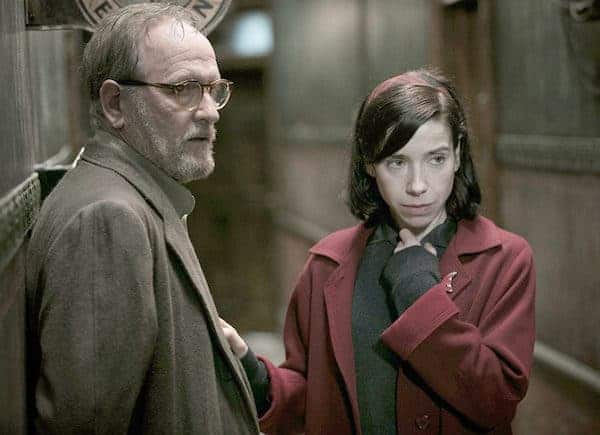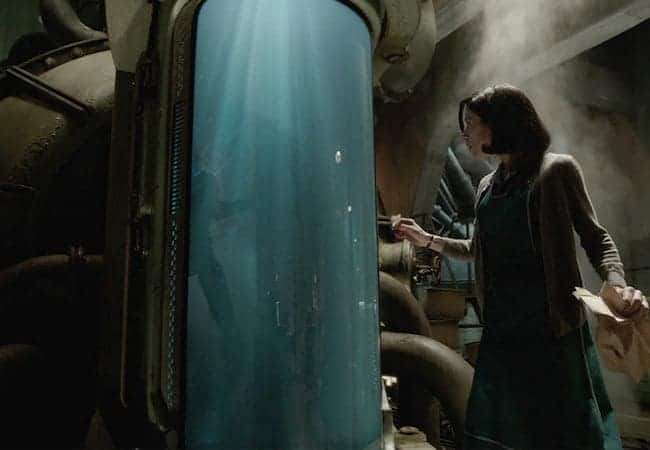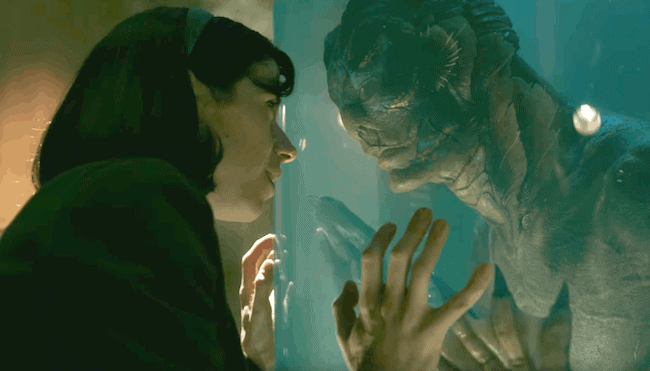Pity the poor critic who goes against the tide of public adulation. No one will thank me for not loving the heavy-handed fairy tale, The Shape of Water. No one will thank me for pointing out, against the tide if you will, that the filmmaker Guillermo del Toro, who crafted the uncanny Pan’s Labyrinth, has not repeated his success with this dark tale of forbidden love, cinema history, and diversity casting.
Short version: cross a Hallmark moment with early David Lynch—add scolding, didactic speeches and a minimalist approach to editing—and you get The Shape of Water, a showcase for characters of every gender, ethnicity, and economic background. Gently add a key disability—our heroine is mute—plus an Amazonian swamp creature (for that sexy dash of Otherness), and mix with Cold War clichés and a shocking amount of gratuitous gore and violence, and you either have a film to ride all the way to Oscar triumph…or a mess.

Sally Hawkins and Octavia Spencer in the film THE SHAPE OF WATER. Photo courtesy of Fox Searchlight Pictures. © 2017 Twentieth Century Fox Film Corporation All Rights Reserved
Oh how I wanted to fall in love with this film. So abundant in visual allure, such burnished color, and the irresistible crucible of forbidden love. But then why should it be forbidden? The filmmaker believes that he is not alone in treasuring the fantasy of a cross-species love. And he is not alone here. That much of the film tantalizes all of our tastebuds. It’s how he litters the trail with simplistic bread crumbs that makes, ultimately, for a flow chart of the wrong choices in this exercise in forking paths. (Sincere apologies to Borges.)
 Magic realism, at its best, is a delicious elixir of visual and intellectual desire. But at its worst….let’s just say that at many crucial turns, the film implodes through its own lack of discipline. LIke a spoiled child with an expensive paintbox, del Toro indulges almost all of his fetishes whenever possible. His admirable championing of the oppressed becomes scolding and lecturing. His full rainbow of racial and gender operatives is so contrived and self-congratulatory as to grow tedious.
Magic realism, at its best, is a delicious elixir of visual and intellectual desire. But at its worst….let’s just say that at many crucial turns, the film implodes through its own lack of discipline. LIke a spoiled child with an expensive paintbox, del Toro indulges almost all of his fetishes whenever possible. His admirable championing of the oppressed becomes scolding and lecturing. His full rainbow of racial and gender operatives is so contrived and self-congratulatory as to grow tedious.
I get it: the Other is a real, living, breathing, loveable being with the same feelings, desires, and hopes that we all have. But del Toro works this obvious moral paradigm to death as if he had invented respect for diversity. I was alternately bored and insulted throughout this two hour exercise .
And then there’s the sobering realization that the film itself was growing tedious, just when all the stars have lined up to create a heartbreaking denouement. Speeches are all too long, except the ones that sling stereotypical soundbites like Marie Antoinette tossing cake to the masses.
You know the scenario by now: a loveless mute Eliza, who works nights as a cleaner in a top secret research facility, lives across the hall (above a fading movie palace) from aging, gay, artist Giles (Richard Jenkins). Eliza (Sally Hawkins) has a work buddy, Zelda (Octavia Spencer) with a heart of gold, tons of spunky attitude, and a layabout husband. (So many stereotypes!). Jenkins’ character is given to multiple, redundant soliloquies about the pitfalls of being an aging, gay artist. Yet del Toro has already shown us that well-worn situation quite clearly when Giles is thrown out of his favorite diner by the surly young owner he has a crush on.
 So much talk, talk, talk that could have become shining screen moments if only the lines, and the scenes, had been edited. Instead all the speeches are indulged, as are del Toro’s passion for the golden age of television (Dobey Gillis) and the Busby Berkeley era.
So much talk, talk, talk that could have become shining screen moments if only the lines, and the scenes, had been edited. Instead all the speeches are indulged, as are del Toro’s passion for the golden age of television (Dobey Gillis) and the Busby Berkeley era.
Sally Hawkins is wonderfully watcheable, yet her character doesn’t expand into our hearts. Ditto her work buddy Octavia Spencer who is forced to embody almost every black cleaning woman cliché that has ever seen the light of cinema. Shameless exploitation of the worst cultural models of working women, women of color, people of alternative genders, disabilities, and financial straits—all of this surrounds a central fable in which the ultimate Other is accepted by, and accepts, the yearning Eliza. How lovely this might have been had it not insulted the viewer with its elementary school lesson plan. See? the director says to us slowly and patiently, see how nicely we could all get along?
Two opposing male sexual forces drive the dramatic tension of The Shape of Water. One is the sadistic boss of the research operation—which takes place during the Cold War, hence acres of paranoia and lengthy spy meetings held in Russian. This character, Strickland, played with merciless roughness by Michael Shannon, somehow stands in for the callous, predatory American male of the 1940-50s. Del Toro unleashes him to commit sudden acts of violence—verbal, psychological, and finally physical. Especially toward the amphibious creature, kept chained in a tank of water, that Eliza begins to befriend, and then fall in love with. As sweet as Strickland is harsh, the Creature attracts Eliza, as they glide into an entrancing relationship that quickens when Strickland orders “it” killed for dissection.
Shannon is a powerhouse, as Strickland, and Strickland is a mesmerizing character, but one required to talk and pose, ponder and extol. We tire of him and his violence, long before he can ignite the finale. And the inter-plot, featuring a Russian spy who works at the research facility, and his various spy masters, bogs down rather than adding texture. Del Toro stoops to just about everything, from suburban sex and gangrenous hands, to endless quotes from 50s television. And even—shades of The Artist —the fairytale lovers at one point morph into silver screen performers, twirling and singing their way through a Fred & Gingeresque version of “You’ll Never Know.”
Instead of telling one adult fairytale of true, if magical, love del Toro decided to tell lots of stories all at once. We the audience must choose which strands taste best, and devour them if we want to leave the theater with appetites satisfied. I left hungry.



“Lack of discipline” sums it up perfectly. He tried to blend every 50s cliche and style into a single Beauty and the Beast storyline.
It had pieces of greatness: the sets, cinematography, and Sally Hawkins performance. But I found myself bored and examining the Deco interior of the theater instead of watching the film.
13 Oscar nominations? Now I am curious why others view this so positively.